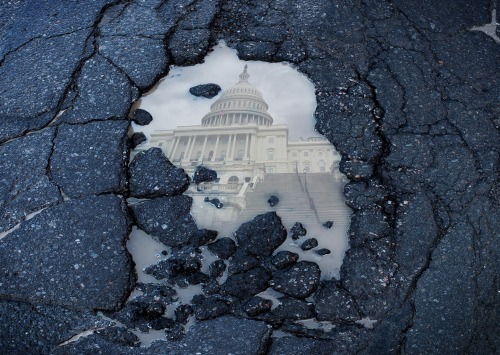
Congress must come together and work in a bipartisan manner if the United States is to see any progress on infrastructure, an independent think tank said.
The New Center said in its recent policy paper, “The Path to a Bipartisan Infrastructure Solution,” that working in a bipartisan nature on infrastructure has two benefits. First, it allows both parties the opportunity to accomplish something of substance in passing infrastructure legislation. Second, it sets the tone for moving forward.
“Democrats and Republicans have an opportunity to do something big and important together; to finally start moving back toward unity at a moment when so many forces in American politics are pulling them apart and when so many Americans have abandoned hope of Washington finding any meaningful bipartisan agreement,” the policy paper said. “America has a once-in-a-generation opportunity to repair the infrastructure we built in the 20th century and to invest in the infrastructure and the technologies we’ll need to build a more sustainable and productive economy in the 21st, to create a new generation of good-paying jobs, to start turning the tide against climate change, and to outcompete a rising adversary in China. If Democrats and Republicans can align on this policy issue, it could create the space and momentum for them to align on others.”
President Joe Biden’s expansive definition of infrastructure in his American Jobs Plan will get no bipartisan support, while an infrastructure bill with no bipartisan support can only pass through budget reconciliation, the group said. An infrastructure bill passed through reconciliation would not be able to include several provisions within Biden’s proposal such as certain permitting and regulatory reforms that would allow projects to be built more quickly and efficiently.
Biden did, however, make some progress on a compromise infrastructure deal last week. U.S. Sen. Shelley Moore Capito (R-WV), ranking member of the Senate Environment and Public Works (EPW) Committee, along with several other Republicans, recently met with the president to discuss a path forward on infrastructure.
“We had another positive and substantive discussion about how to address our nation’s infrastructure challenges in a bipartisan way,” Sen. Capito said on May 13. “We listened to one another, and I felt that the president was receptive to our ideas and viewpoints.”
The White House expects a revised Republican infrastructure proposal this week.
All of Washington, the New Center report said, should realize that infrastructure is a “two-party problem that demands a two-party solution” and that requires creative thinking to determine which investments to prioritize and how to pay for them.
In determining which projects to fund, the group said Congress should create a nonpartisan “National Infrastructure Board” that would determine which projects should be prioritized. Modeled after the military’s Base Realignment and Closure (BRAC) commissions, the new board would overcome the current fragmented processes and could expedite permitting and avoid wasteful contracting, according to Philip Howard of Common Good, who proposed the idea in a New York Daily News op-ed.
Additionally, the report said, the Federal Transit Administration should re-evaluate its project scoring system that favors new facilities over projects that increase core capacity.
The report also said empowering local and state governments and giving them more flexibility in how to spend federal dollars could create new revenue streams dedicated to infrastructure spending. States and localities are responsible for the majority of infrastructure spending, accounting for three fourths of the $416 billion in public money spent on infrastructure in 2014.
Coming up with new revenues streams will be key to paying for infrastructure, the report said. While President Biden’s $2.3 trillion proposal raises the corporate tax rate from 21 percent to 28 percent, the Republicans’ $568 billion plan would repurpose existing federal funds and add new user fees on things like electric vehicles.
Instead, the New Center recommended looking at closing the tax gap between what taxes are owed and what taxes are actually paid by getting more information on the income of taxpayers in the top quarter of income, upgrading technologies at the Internal Revenue Service, and reforming the IRS audit process. Addressing the tax gap, the group said, would raise $1.6 trillion dollars over the next decade.
The organization also advocated using public-private partnerships (P3) to fund infrastructure projects to leverage limited government funding, while shifting risk to the private sector and making the most of private sector technological and operational expertise.
Although the group said the current political climate makes bipartisanship challenging for Republicans and Democrats, voting in an infrastructure bill is something both sides need to come together on.
“It’s hard to see how Congress could or would tackle policing, voting, or immigration—issues that have no chance of being moved via reconciliation and would therefore need 60 votes to pass the Senate—if they can’t get there on infrastructure,” the group said. “This is a chance for Washington to show it can actually work to strike a deal that appeals to the broad center of the American electorate. They should seize the opportunity and strike an ambitious, two-party deal to rebuild American infrastructure and invest in a brighter economic future.”